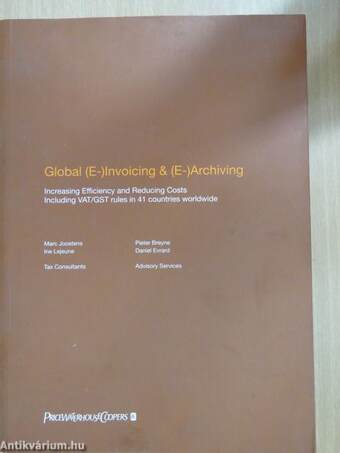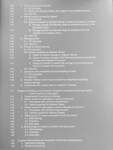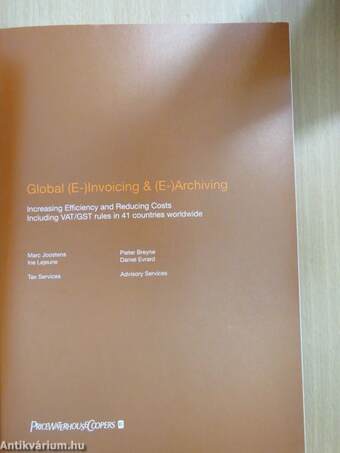1.067.317
kiadvánnyal nyújtjuk Magyarország legnagyobb antikvár könyv-kínálatát

VISSZA
A TETEJÉRE
JAVASLATOKÉszre-
vételek
Global (E-)Invoicing & (E-)Archiving
Increasing Efficiency and Reducing Costs/Including VAT/GST rules in 41 countries worldwide
| Kiadó: | PriceWaterhouseCoopers |
|---|---|
| Kiadás helye: | |
| Kiadás éve: | |
| Kötés típusa: | Fűzött papírkötés |
| Oldalszám: | 543 oldal |
| Sorozatcím: | |
| Kötetszám: | |
| Nyelv: | Angol |
| Méret: | 24 cm x 17 cm |
| ISBN: | 90-80-69-31-97 |
naponta értesítjük a beérkező friss
kiadványokról
naponta értesítjük a beérkező friss
kiadványokról
Fülszöveg
Results from a European survey, conducted by PricewaterhouseCoopers during Summer
2005 by the team of authors, indicate that one third of businesses already exchange
electronic invoices rather than hard copies to a greater or lesser extent although in some
cases they also continue to issues hard copy invoices too. The main drivers for adopting an
electronic approach to invoicing and archiving appears to be increased efficiency and cost
reduction. It is expected that electronic invoicing projects, as well as digitisation of hard copy
archives, will be one of the priority investments for businesses in 2006.
Within this book, we cover both legislative compliance and the practical implications for
business of (electronic) invoicing and archiving.
Part One deals with the practical considerations, including:
• E-invoicing models;
• Solution-requirement criteria;
• Impact analysis;
• Defining and developing the business case.
Part Two deals with the legislative compliance... Tovább
Fülszöveg
Results from a European survey, conducted by PricewaterhouseCoopers during Summer
2005 by the team of authors, indicate that one third of businesses already exchange
electronic invoices rather than hard copies to a greater or lesser extent although in some
cases they also continue to issues hard copy invoices too. The main drivers for adopting an
electronic approach to invoicing and archiving appears to be increased efficiency and cost
reduction. It is expected that electronic invoicing projects, as well as digitisation of hard copy
archives, will be one of the priority investments for businesses in 2006.
Within this book, we cover both legislative compliance and the practical implications for
business of (electronic) invoicing and archiving.
Part One deals with the practical considerations, including:
• E-invoicing models;
• Solution-requirement criteria;
• Impact analysis;
• Defining and developing the business case.
Part Two deals with the legislative compliance of invoicing and archiving, and covers the
following areas:
• The relevance of an invoice for VAT/GST purposes;
• The legislative process and the scope of application;
• OECD Tax Guidance Papers;
• The obligation to issue an invoice;
• Content of an invoice;
• Format of an invoice;
• Storage of invoices;
• Building a cross-border compliant invoicing and storage system;
• Accounting and corporate tax considerations.
Part Three then comprises detailed information on 41 countries around the globe. Vissza
Témakörök
- Közgazdaságtan > Menedzserképzés, marketing
- Közgazdaságtan > Számvitel, elemzés
- Idegennyelv > Idegennyelvű könyvek > Angol > Közgazdaságtan > Menedzserképzés, marketing
- Idegennyelv > Idegennyelvű könyvek > Angol > Közgazdaságtan > Számvitel, elemzés
- Közgazdaságtan > Lexikonok, kézikönyvek, szótárak
- Idegennyelv > Idegennyelvű könyvek > Angol > Közgazdaságtan > Lexikonok, kézikönyvek, szótárak


















